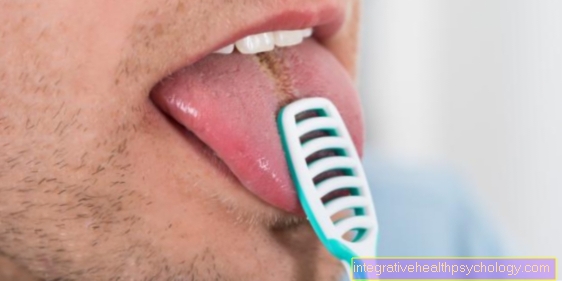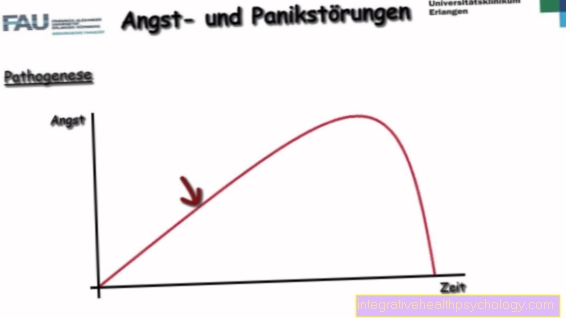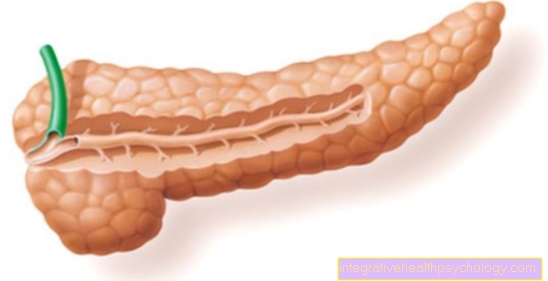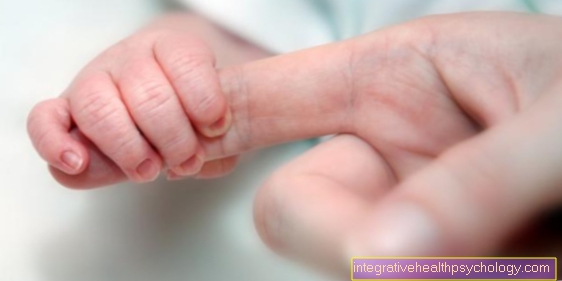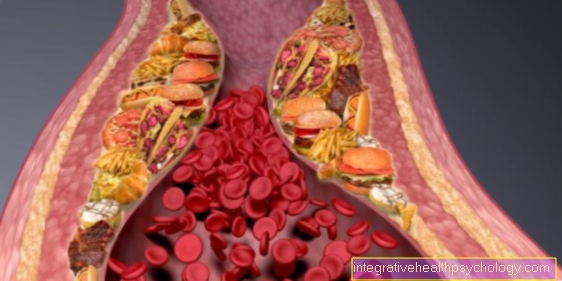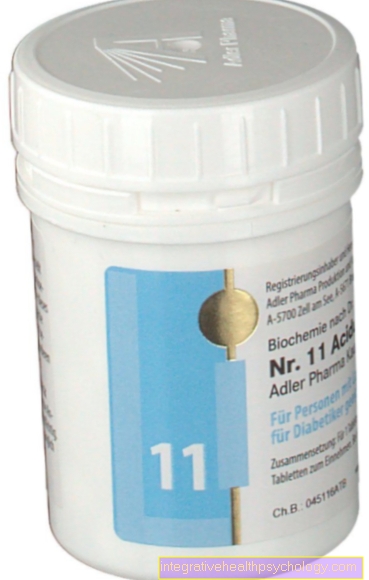Burning sensation after urination
introduction
The burning sensation after urinating, too Dysuria called, can have different causes.
The so-called uncomplicated cystitis or inflammation of the lower urinary tract are among the most common.
Other possible reasons can be injuries, tumors, and gender-specific causes. Women are far more likely to be affected by urinary tract infections than men because the path from the bladder to the urethra exit is shorter for them than for men and pathogens can enter more easily.

To find out the cause of the burning sensation, a urine test will be done and a urine culture will be done. In some cases, diagnostic imaging such as ultrasound can help.
Treatment for most diseases consists of drinking plenty of fluids, emptying the bladder regularly, and applying heat to pain. The administration of antibiotics is not always necessary. An uncomplicated urinary tract infection usually heals within a week.
Read more on the subject below Problems urinating.
causes
Cystitis as the cause
The uncomplicated cystitis (Cystitis) is the most common cause of burning sensations when using the toilet.
Other typical symptoms of a urinary tract infection are frequent urination and pain in the lower abdomen. In children and elderly patients, however, the symptoms can vary and are then noticeable as abdominal pain, nocturnal urination, worsening general condition, fever or continence problems.
Urinary tract infections are mostly caused by intestinal bacteria such as E. coli, enterococci, Proteus spp. and less frequently staphylococci and promoted by sexual intercourse, use of antibiotics, diabetes mellitus and anatomical or functional peculiarities.
The complicated urinary tract infection
A complicated urinary tract infection is when the pathogens have penetrated through the ureter to the renal pelvis and there is an inflammation of the pelvis (Pyelonephritis) caused. The pelvic inflammation usually occurs on one side and in addition to the symptoms of cystitis there are fever, pain in the area of the kidney, a feeling of severe illness and possibly blood in the urine.
Interstitial cystitis
A disease that mainly affects women, which in addition to a burning sensation also causes frequent urination and nocturnal urination and above all pain in the bladder area, is interstitial cystitis, also known as "painful bladder syndrome". This chronic inflammatory disease is abacterial, i.e. not triggered by bacteria, but the cause is still unclear. Affected patients often also have another chronic disease such as irritable bowel syndrome or fibromyalgia.
Inflammation of the urethra
However, the burning sensation after urinating can also be caused by inflammation of the urethra (Urethritis) caused by bacteria, viruses or injuries due to medical interventions.
Other causes
There are also gender-specific causes, for example inflammation of the uterus or vagina in women, and inflammation of the prostate in men.
Rarer causes of a burning sensation after urination can be urinary bladder tumors, schistosomiasis (tropical infectious disease in which worms implant in the urogenital tract), bladder stones or a narrowing of the urinary bladder after an injury (urethral stricture).
Special causes in men
If the man experiences a burning sensation after urinating, this may be due to an inflammation of the glans (Balinitis), the foreskin (which often accompanies balinitis, one then speaks of balanoposthitis) or the urinary tract and the bladder. When the pain occurs when urinating may be an indication of the cause of the pain. If the pain is immediately at the beginning of urination, the glans or urethra is usually affected. If the pain only occurs at the end of urination, a cystitis is suspected.
Inflammation of the glans occurs mainly in uncircumcised men, as poor intimate hygiene can irritate the sensitive glans. But too much intimate hygiene can be bad for the glans because soaps lose the acid protection of the mucous membrane or there is a contact allergy with ointment ingredients or fragrances. A latex allergy can also manifest itself in an inflammation of the glans and lead to burning after using the toilet or to burning of the glans. Other common causes of inflammation of the glans are infections with fungi, bacteria or viruses, which can be sexually transmitted. Inflammation of the glans can lead to pain after urination, purulent secretions, reddening, itching and swelling.
Inflammation of the urethra (Urethritis) can be caused by infection or injury. Urethral infection is divided into gonorrhoeic and non-gonorrhoeic. This is based on whether the infection was triggered by gonorrhea (colloquial gonorrhea) or other pathogens (e.g. chlamydia). Injuries to the urethra are usually caused by medical interventions such as the insertion of a urinary catheter or examinations, and more rarely by the introduction of foreign bodies by the patient.
Bladder infections in men are rare, but are usually triggered by an enlarged prostate, anal intercourse, an HIV infection, or a urinary catheter. If a bladder infection is the cause of pain after urination and if there are fever, back pain and a general feeling of illness, the prostate is often also inflamed (prostatitis), which must be treated by a doctor.
Read more on the topic: Painful urination in men
Special causes in women
The most common cause of burning sensation in women after urination is cystitis (Cystitis). However, there are other causes such as inflammation of the urethra or female genital organs.
Typical symptoms of a cystitis are burning and pain after urination, frequent urination, and abdominal discomfort. In most cases, cystitis is caused by bacteria.
In particularly sexually active phases, women can suffer from so-called "honeymoon" cystitis, where frequent sexual intercourse changes the vaginal environment and thus makes it easier for pathogens to implant.
To prevent this, urinating directly after sexual intercourse is recommended. But frequent sexual intercourse can also lead to irritation of the female genitals, which is then expressed as a burning sensation after using the toilet. In women going through menopause, the lack of the female sex hormone estrogen can lead to inflammation of the labia and vagina (vulvovaginitis), which can cause discomfort after urinating or during sexual intercourse.
An increased colonization of the vagina by the bacterium Gardnarella vaginalis leads to so-called bacterial vaginosis, which in most cases goes unnoticed and does not cause any symptoms, but sometimes it can lead to inflammation of the vagina (colpitis or vaginitis) and putrid, fishy discharge. Other causative agents of colpitis can be Candida albicans (a yeast fungus), Trichomonas vaginalis or herpes viruses.
Again, there is discharge, itching, burning sensation in the vagina and pain when urinating. If this colpitis goes unnoticed for a long time, the infection can reach the kidneys or lead to infertility.
An inflammation of the urethra (urethritis), which is triggered by bacteria (chlamydia, gonococci, etc.) or viruses (herpes viruses), can also be a cause of the burning sensation, although the beginning is rather insidious. Often there is also inflammation of the cervix.
Read more on the topic: Painful urination in woman
Homeopathy for burning sensation after urination
In addition to home remedies such as drinking a lot, warm compresses and taking cranberry or lingonberry preparations, homeopathic remedies can also help relieve the burning sensation after urination.
Typical remedies for burning sensation when urinating would be Apis, which also helps with menstrual cramps and scanty urine; Berberis, which also helps with general kidney problems and exhaustion; Cantaris for extremely severe burning and stabbing pains; Lycopodium for additionally bad smelling urine and flatulence of the intestines; Nux vomica with constant urge to urinate, which remains unsuccessful; Sarsaparilla for pain at the end of urination, the urine may also be dark in color; Sepia, when the burning sensation is particularly severe at menstruation and urination occurs spontaneously; and Staphysagria, with burning sensation when urinating after sexual intercourse.
If, however, there is pain in the back or hip, fever or blood in the urine, or the symptoms persist for more than a week, a doctor should be consulted immediately who can rule out serious illnesses.
Burning sensation after urination during pregnancy
If there is a burning sensation after urination during pregnancy, a urinary tract infection must always be excluded.
The urinary tract infection does not pose a threat to the unborn child, but the pregnant woman can develop an inflammation of the kidney pelvis (Pyelonephritis) when the bacteria migrate from the bladder to the kidney via the ureters.
A urinary tract infection is suspected, especially if there is pain when urinating in addition to the burning sensation.
Read more on the topic: Painful urination during pregnancy
This can lead to serious pregnancy complications such as premature birth, as well as symptoms such as chills and fever, pain in the kidney area, difficulty emptying the bladder and a feeling of severe illness. If there is an inflammation of the kidney pelvis, hospitalization and bed rest are necessary in order to carry out targeted antibiotic therapy and to ensure adequate fluid intake. Furthermore, other causes of the urinary tract infection should be clarified, for example a urinary tract disorder.
When examining the urine, a urine culture should always be created in order to determine the exact pathogen and to treat it specifically, as not every antibiotic is suitable for pregnancy. The antibiotic therapy usually lasts a week and then it should be checked whether the therapy was successful. Studies have shown that the successful treatment of pathogens in the urine, regardless of whether the pregnant woman complained of symptoms such as a burning sensation after going to the toilet or not, can lower the risk of premature birth. For this reason, a urine test is planned in the course of prenatal care in order to determine symptom-free accumulation of bacteria in the bladder or urinary tract and to treat it if necessary.
Burning sensation after urination in children
A burning sensation after urination in children is often caused by a urinary tract infection, but the burning sensation is more likely to be the leading symptom in older children.
In infants and young children, vomiting or an unexplained fever may also be the only symptom. Sometimes bed-wetting that occurs again after the child has actually not gone to bed is a sign of a urinary tract infection.
Urinary tract infections are more common in girls; boys under one year of age are most likely to develop a urinary tract infection.
To clarify the cause of the burning sensation or other symptoms, a complete physical examination of the child should be done by the doctor to rule out changes such as a narrowing of the foreskin or sticking of the labia.
A urine test can determine if there is inflammation of the urinary bladder or lower urinary tract. If nitrite, which is a breakdown product of bacteria, and leukocytes, the white blood cells, are found in the urine during the test, this strongly suggests a urinary tract infection.
Circumcision lowers the rate of urinary tract infections in boys, but the risk of complications from circumcision is high, so it would only be worthwhile in the case of recurring urinary tract infections. If a urinary tract infection can be found and other causes of burning sensation after peeing in the child can be ruled out, antibiotics are given for a week or less.
Read more on the subject at: Urinary tract infections in children - it's that dangerous!
Burning of the glans
If there is a burning sensation on the glans after urinating, this can have various causes. Most of the time, the burning sensation is also accompanied by other symptoms such as itching, redness, swelling, or purulent secretions.
Even drying out of the mucous membrane through excessive cleaning or for other reasons can irritate the sensitive glans; this is called balanitis simplex, i.e. inflammation of the glans due to unspecific irritation.
Furthermore, allergic reactions to ointment components, latex or fragrances can lead to a burning sensation after urination.
Somewhat more complex is the zoon plasmacellular balanitis, which is a chronic inflammation of the glans penis without an established cause. This leads to lacquer-like, red-brown and smooth spots. Poor intimate hygiene or a narrowed foreskin can lead to inflammation of the glans.
The other group of causes of burning sensations after peeing are infections of the glans penis. These include fungal infections, infections with viruses (most commonly herpes viruses or genital warts) or parasites (e.g. pubic lice), but also infections caused by bacteria that can cause syphilis or other diseases, for example. The infection with these pathogens mostly happens through sexual contact with an infected person.
Read more about this under: Acorn burns



